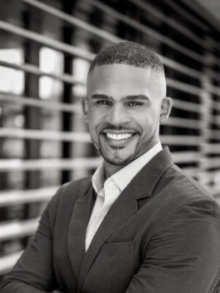Namon Freeman
Master of Urban Planning
-
2016

CAN YOU TELL US A BIT ABOUT YOUR JOB RESPONSIBILITIES?
I’m a manager at Bloomberg Associates (BA), a pro bono consulting firm that works with cities across the globe. I work as part of the sustainability team and lead all of our engagements related to housing affordability. At BA we see sustainability as three pronged; social, economic and environmental sustainability. We work directly with mayors, supporting them and their senior staff, e.g., deputy mayors and housing commissioners, to develop comprehensive housing strategies and implement nuanced housing policies and programs. Examples of our work ranges from developing emergency rental assistance programs (ERAP) during the pandemic, to helping cities identify and track their overarching housing goals. BA’s work currently spans an international portfolio of cities including London, Detroit, Newark, Milan, Phoenix, Tampa, Bratislava, and Lisbon.
WHAT WERE YOU DOING BEFORE YOU CAME TO NYU WAGNER?
In 2012, I graduated from Hampton University in Virginia with a Master of Architecture and a BA in Spanish. I worked as an architect in urban design firms for some time. While working in Washington, DC Office of City Planning, I realized that I could have the most impact in cities by shaping the urban policy and regulatory frameworks that govern the built environment rather than designing at the scale of a single building or site. That interest in planning at the city scale and doing it in developing countries, particularly in the Global South, is what brought me to Wagner. I chose the International Development tract and focused my attention toward Latin America and Africa, where I saw a greater potential for impact on the communities I care most about.
WHY DID YOU CHOOSE NYU WAGNER FOR GRADUATE SCHOOL?
My choice for graduate school came down to UC Berkeley's program and NYU Wagner’s. Wagner ultimately won out for a multitude of reasons, but three major things stick out. Wagner is known for its distinguished professors, many of whom were full-time professionals rather than being solely in academia and research. I was very much excited to learn from those who were doing the work and not just theorizing about it. Wagner also had an advantage being located in NYC, the preeminent urban environment in the Western hemisphere. This location provided access to many of the international organizations that set best practices related to planning and development. I ultimately ended up getting the opportunity to work for one of those organizations (the UN) twice during my tenure at NYU. Lastly, the urban planning program at UC Berkeley is housed within the school of environmental design and takes more of an urban design approach to the practice. Given my background in architecture and urban design, I found that program to be less likely to supplement the skills I already had.
HOW DID YOUR EXPERIENCES AT NYU WAGNER PREPARE YOU FOR YOUR CAREER?
My experiences certainly prepared me for the career that I have now. It started as early as our orientation retreat, where I got to know several of my classmates, many of whom would become future colleagues. Wagner gave me the opportunity to work internationally in Africa and Latin America. Two of the three most important classes I took were with my favorite professor, Paul Smoke. One of those courses was Decentralized Development Planning, the learnings of which I still lean on to this day as I help local governments advocate for planning power. The third course was Real Estate Finance, which I continue to use as I develop programs and policy that make creating and preserving affordable housing more feasible. Wagner more than provided me with both the network and the hard skills to navigate and thrive in today’s development and planning profession.
WHAT IMPACT DO YOU HOPE TO MAKE THROUGH YOUR CAREER AND/OR ORGANIZATION?
There are two things that drive me. One is ensuring that cities are growing more sustainably. I believe that cities are the economic and cultural engines of society, and their ability to accommodate an ever growing population is essential to maintaining ecological balance on this planet. The other thing is racial justice, particularly wealth justice. My work in the housing space is informed by my experiences growing up in the Southeastern US. Witnessing the disparities between the built environments that Black people reside, work, and play in versus those that white people inhabit, motivated me to pursue a profession where I could shape the world we live in. Working to design better housing strategies and policy allows me to influence both the long-term sustainability of our cities, but also increase access to economic opportunity and wealth building.
HOW DID YOU FIND YOUR POST-NYU WAGNER JOB?
I had a non-traditional experience at Wagner: I started as a full-time student and halfway through the first year, I made a professional connection that led to an internship with UN Habitat in Nairobi, where I worked for 7 months before returning to Wagner as a part-time student. My professor and program chair at the time, Ingrid Gould Ellen, introduced me to the executive director at the NYC Department of City Planning (DCP). It was serendipitous and I ended up taking a role as her special assistant and continued my studies as a part-time student. Because I started working while I was in school, I had the benefit of gaining experience and putting my learning into practice in real time, in both national and international contexts. Ultimately, I graduated already having full-time employment, thus I had the time and flexibility to generously ponder my next professional step. That resulted in finding a position with a national affordable housing non-profit that focused on racial equity, had an international reach/portfolio, and was also a remote workplace.